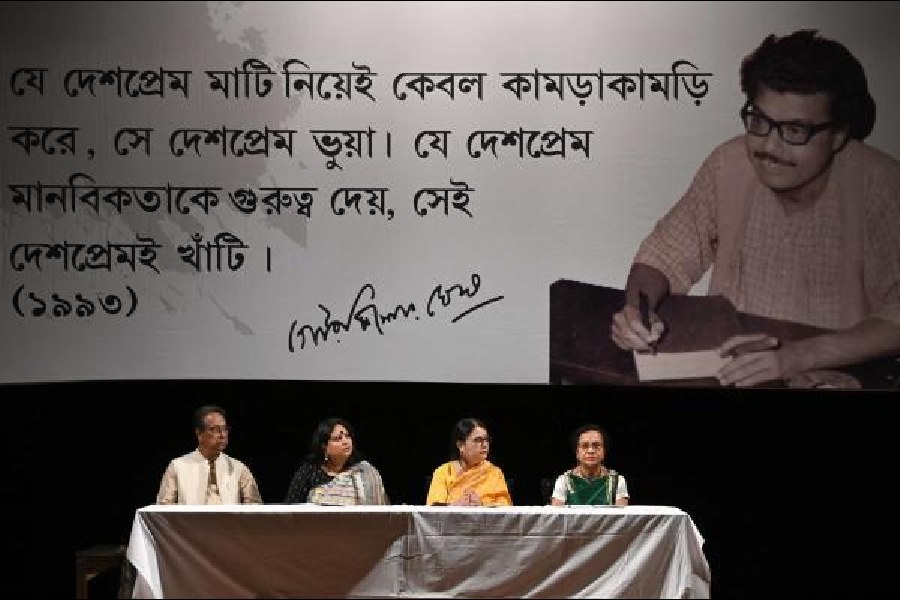The silence over what is happening in Manipur is “unimaginable” and raises questions about whether citizens can demand any accountability from those who they have elected to power, an author said on Tuesday evening.
Anita Agnihotri, whose body of works includes essays, novels and writings for children, also questioned the lack of any news on the situation in Manipur in a large section of the media.
She referred to the use of sedition laws and an increasing tendency to book dissenters under laws that make it nearly impossible for them to get bail.
“The silence over what is happening in Manipur, this is unimaginable. The internet services are suspended there and we do not get to know what is happening. This silence raises questions about whether we can ask for any accountability from thosewho have been elected to power,” she said. “Once elections are over, we cannot expect any answers. This is turning out to be a great danger for democracy.”
Agnihotri was chairing a discussion on “Deshoprem Deshodroho (Patriotism Sedition)” at GD Birla Sabhaghar on Tuesday. It was part of the concluding event of the birth centenary celebrations of journalist Gour Kishore Ghosh.
She said though common people could sense the situation in violence-racked Manipur, there is no news on what is happening in the state in a large section of the media.
Over 110 people have been killed in clashes in Manipur over the past few weeks.Many churches have been desecrated.
India has a working Constitution, yet laws were subsequently framed in such a manner that they can be used to curb or, at times, crush personal freedoms.
The misuse of laws to silence any dissenting voice also came up in her talk. The arrest and long imprisonment of journalist Siddique Kappan and the arrest of climate activist Disha Ravi were mentioned in the discussions.
Kappan, who was arrested while on the way to Hathras in Uttar Pradesh to cover the gangrape and murder of a Dalit teenager, obtained bail after 28 months in jail.
Disha was slapped with charges of sedition and criminal conspiracy for a social media toolkit she edited and shared in support of the farmers’ movement on the outskirts of Delhi.
“Opposition to the government or those in power has been there for ages and in all civilisations. Till the time mindless violence accompanies this opposition to those in power, priority should be accorded to free speech,” Agnihotri said.
Sedition was included in the Indian Penal Code during the British-era.
Section 124A of the Indian Penal Code deals with sedition. “The sedition law was applied against the likes of Mahatma Gandhi, Tilak and Nehru. Independent India preferred to go ahead with this section,” Agnihotri said. “Sedition is being invoked for saying anything against the government by speaking or writing, through signs or by visual representation, even by using cartoons.”
A former civil servant,Agnihotri said that 13,000individuals were booked for sedition between 2010 and 2021, but only seven persons were convicted between 2010 and 2016.
Some other laws being used against dissenters are so ruthless that they do not have provisions for bail and the accused languish in prisons for months before they can obtain bail, another panellist pointed out.
Patricia Mukhim, a journalist from Shillong, said “the process one had to undergo to obtain bail was itself a punishment”. “Only those who have gone through this will understand the pain.”
Journalist Semanti Ghosh spoke about how people themselves have taken up the responsibility of being vigilantes. “The rulers do not need to anything. There are people in the community who have assumed the role of vigilantes,” she said.
The discussion was held against the backdrop of a giant banner where the words of Gour Kishore Ghosh, who was imprisoned during the Emergency, were printed. It said: “Je deshoprem maati niyei kebal kamrakamri kore, se deshoprem bhua. Je deshoprem manobikota ke gurutto dey, sei deshoprem i khanti. (The patriotism that is only concerned about fighting over land is fake. The patriotism that values humanity is the real patriotism.)”
